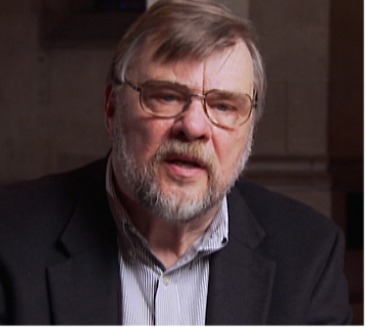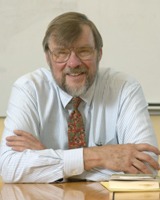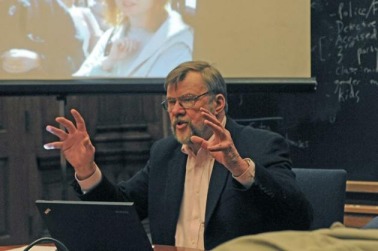In Memoriam: Richard Hackman, 1940 – 2013
J. Richard Hackman was the right person at the right time in the orchestral world. And, he was also the right person at the right time in my life. I learned a tremendous amount from him. A “towering figure” literally and figuratively in the field of social and organizational psychology, Richard was at the height of his academic career when he came to Harvard from the Yale School of Management in 1986. His unique perspective on what conditions need to be in place in order for a team to succeed at its work were thought-provoking and have informed my world view — and that of his students and participants in his field research. Richard’s four-pronged framework: “Direction, Structure, Context, Coaching” for short, are burned into my brain. Every time I enter a workplace or meet a work team, I think: What kind of leadership do they have here? It is clear, challenging and compelling? Do they have the right mix of people with the right skills in this organization or on this team and are they fully engaged? Do they have the resources they need to do their work? And, is there someone coaching them along the way, to make sure problems are resolved and lessons learned. Is there a commitment to continuous learning imbued in this place? (And could I see myself working here?)
 Shortly after I came to work for Richard at Harvard, he decided to apply his theoretical perspective to a different industry than the ones he had been studying up to that time, and so initiated a new wave of research on orchestras. I was to do the field research in the U.S. and Great Britain, with Jutta Allmendinger, then a sociologist at the University of Munich, covering the East and West German orchestras. Together, we embarked on that famous study of symphony orchestras. You know — the one that Bernard Holland, then-Chief Music Critic of the New York Times, heralded in his 1995 article “A Pathetic Living at the Symphony?” for many findings, including that the majority of musicians we surveyed reported they were no happier than Federal prison guards in their work. A provocative finding for sure (that was real data), but you should read the full article. Holland captures what we saw at that time: An industry plagued by perennial problems and age-old inter-party disputes.
Shortly after I came to work for Richard at Harvard, he decided to apply his theoretical perspective to a different industry than the ones he had been studying up to that time, and so initiated a new wave of research on orchestras. I was to do the field research in the U.S. and Great Britain, with Jutta Allmendinger, then a sociologist at the University of Munich, covering the East and West German orchestras. Together, we embarked on that famous study of symphony orchestras. You know — the one that Bernard Holland, then-Chief Music Critic of the New York Times, heralded in his 1995 article “A Pathetic Living at the Symphony?” for many findings, including that the majority of musicians we surveyed reported they were no happier than Federal prison guards in their work. A provocative finding for sure (that was real data), but you should read the full article. Holland captures what we saw at that time: An industry plagued by perennial problems and age-old inter-party disputes.
Those problems, many of which still exist to some degree today, ranged from concern about “the graying” of the audience and structural problems inherent in orchestra economics to the organizational model of a “three-legged stool,” which included the board chair, music director, and managing director, but left players out of the governing equation. Like Congress’ fractious inter-party relations today, we found an environment where — in many orchestras, but not all — people didn’t get along so well: boards, managers, and players, the musicians’ union and associations like ASOL, ICSOM and ROPA — a lot of misunderstanding and finger pointing about things going wrong— artistically, financially, and organizationally. Although players wanted more say in their work lives, this was a rarity — except for the self-governing orchestras in our study.
What Richard’s unique perspective and our research were able to contribute, I believe, was that it changed the conversation.
We discovered that there were orchestras in the world where players held more significant roles in their organizations and we explored those in detail. I was so excited about this that I wrote a dissertation on musician involvement and leadership in the London and Berlin self-governing orchestras, which Richard enthusiastically endorsed. That same year, in 1995, we met and joined forces with Paul Judy, who generously supported and helped to disseminate our research. Together, we presented our findings to ASOL (now the League), ICSOM, ROPA, and at other conferences in order to try to facilitate change in the industry, and to dislodge the often intractable positions and views of vested interest groups. In retrospect, I think we had some impact. Thanks to Richard and his tireless dedication to action-oriented research and making organizations more human and humane, where work is meaningful and, more-often-than-not, engaging, rather than being “just a another job.”
Richard’s work can be found at his website — http://www.people.fas.harvard.edu/~hackman — and I encourage you to visit it. His conceptual framework for understanding teams is described there, as well as his 2004 book, Leading Teams: Setting the Stage for Great Performances, and many other academic articles and reports that I think you’ll find fascinating. Of course, the orchestra research is archived in Harmony on Polyphonic.org; here’s a link to an interview with Paul Judy.
Richard will be sorely missed by those of us who had the privilege to know him and work with him, but his legacy is available to all through his writings. I hope you’ll take the time to read some of his work.
January 18, 2013
Erin Lehman, Ph.D.


OK I found it – Trombone
thanks
Hi Erin
What a sad note.
What a great guy.
I have read and re-read ‘Leading Teams’ to the point that the cover is falling off.
Can you give me some information for a blog post I am writing?
I know that J Richard Hackman played an instrument in an ensemble because I recall an illustration he used.
However I can’t find it and would like to mention the instrument.
I love the story Teresa Amabile tells of how JRH lifted her up to see the flowers.
He must have been such a nice man.
All the best
Stephen